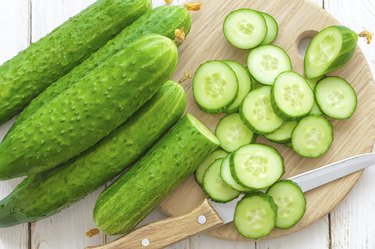
Dozens of fruits and vegetables are off-limits for those living with GERD, or gastroesophageal reflux disease. But if you eat a cucumber, acid reflux won't get worse. This vegetable is alkaline and contains no fat, so it's unlikely to aggravate your symptoms.
Tip
Cucumbers are alkaline and extremely low in fat, so they're unlikely to worsen GERD. Just make sure you don't serve them with tomatoes, hot peppers, onions and other foods that may trigger acid reflux.
Video of the Day
What Is GERD?
More than 20 percent of people in the U.S. have GERD, reports the National Institute of Diabetes and Digestive and Kidney Diseases (NIDDK). This is a more severe form of gastroesophageal reflux (GER), or heartburn, a condition that causes the stomach contents to leak back into the esophagus. People with GERD typically experience a burning feeling or pain in the chest, nausea, vomiting, bad breath and other symptoms.
Video of the Day
Both GERD and GER have a variety of causes, points out the NIDDK. These may range from smoking and obesity to certain medications, such as antidepressants and painkillers. Pregnant people and people with overweight are more prone to GERD.
Your eating habits matter, too. Certain foods can trigger or worsen GERD and heartburn, warn the experts at Harvard Health Publishing. Fatty and fried foods, for example, are harder to digest, leaving more time for stomach acid to come back up into the esophagus. Other common offenders include:
- Spicy foods, such as hot peppers
- Coffee (including decaf versions)
- Chocolate
- Citrus fruits and juices
- Carbonated beverages
- Tomatoes
Carbonated water and cola, for instance, contain bubbles that expand in your stomach and increase the pressure. Due to their high acidity, citrus fruits relax the esophageal sphincter and may worsen heartburn.
Cucumbers and Acid Reflux
As mentioned above, acidic foods may aggravate GERD and increase the discomfort associated with this condition. According to the Food and Drug Administration, foods with a pH of 4.6 or below are considered acidic. These include most fruits, such as apples, grapes, oranges, grapefruits, lemons and blueberries.
With a few exceptions, vegetables are alkaline and shouldn't worsen GERD. Cucumbers have a pH of 5.1 to 5.7, so they fall into this category. Pickled varieties, however, are acidic and may not be safe for those with GERD or heartburn.
As you see, there is no connection between cucumbers and acid reflux. Just make sure you don't eat them along with spicy, fatty or acidic foods.
An October 2014 research paper published in Przeglad Gastroenterologiczny indicates that fried, sour, spicy, and high-fat or high-sugar foods are more likely to worsen GERD. Peppermint tea may aggravate your symptoms too, despite being a natural digestive aid. Researchers also recommend eating small, frequent meals instead of one or two large meals.
Read more: The 10 Worst Foods for Acid Reflux
These guidelines may seem restrictive, but following them can prevent complications and improve your symptoms. If left unaddressed, GERD may lead to esophagitis, Barrett's esophagus, chronic nausea and other serious issues, reports a review featured in the May-June 2018 issue of Missouri Medicine. Esophagitis, for example, is an inflammatory condition that may cause scarring of the esophagus, gastrointestinal bleeding and peptic ulcers.
Related Reading
Why Eat Cucumbers?
Now that you know more about cucumbers and acid reflux, you may wonder how these veggies benefit your health. First of all, they are high in water and fill you up quickly, making it easier to maintain your weight. Cucumbers are over 95 percent water and have only 16 calories per cup. You'll also get the following nutrients:
- 0.7 grams of protein
- 3.8 grams of carbs
- 0.1 grams of fat
- 3 percent of the DV (daily value) of potassium
- 5 percent of the DV of copper
- 4 percent of the DV of manganese
- 3 percent of the DV of vitamin C
- 5 percent of the DV of vitamin B5
Potassium, one of the most abundant minerals in cucumbers, supports normal cell function and regulates fluid levels in the body, states the National Institutes of Health Office of Dietary Supplements. Although most fruits are rich in this nutrient, they may not be safe for those with GERD. Therefore, eating cucumbers and other vegetables, like iceberg salad, lettuce and broccoli, will boost your potassium intake without worsening heartburn.
Cucumbers are also rich in bioactive compounds with antioxidant, anti-diabetes and detoxifying effects, according to a January 2013 review in Fitoterapia. Plus, they may help relieve constipation due to their high water content. The water in fruits, vegetables and other foods contributes to your daily fluid intake and keeps your digestive system running smoothly.
Beware, though — heartburn triggers are different from everyone. Cucumbers may or may not be safe for you when it comes to managing GERD. Keep a food journal and record what you eat at every meal. If you're not sure what's causing your symptoms, try an elimination diet or see a healthcare provider.
- National Institute of Diabetes and Digestive and Kidney Diseases: "Definition and Facts for GER and GERD"
- National Institute of Diabetes and Digestive and Kidney Diseases: "Symptoms and Causes of GER and GERD"
- Harvard Health Publishing: "What to Eat When You Have Chronic Heartburn"
- American Society for Gastrointestinal Endoscopy: "Diet and Gastroesophageal Reflux Disease (GERD)"
- Food and Drug Administration: "Code of Federal Regulations Title 21 - Acidified Foods"
- Clemson University: "pH Values of Common Foods and Ingredients"
- Przeglad Gastroenterologiczny: "Risk Factors for Gastroesophageal Reflux Disease: The Role of Diet"
- Missouri Medicine: "Gastroesophageal Reflux Disease (GERD)"
- Mayo Clinic: "Esophagitis"
- USDA: "Cucumbers"
- National Institutes of Health Office of Dietary Supplements: "Potassium"
- Fitoterapia: "Phytochemical and Therapeutic Potential of Cucumber"
Is this an emergency? If you are experiencing serious medical symptoms, please see the National Library of Medicine’s list of signs you need emergency medical attention or call 911.